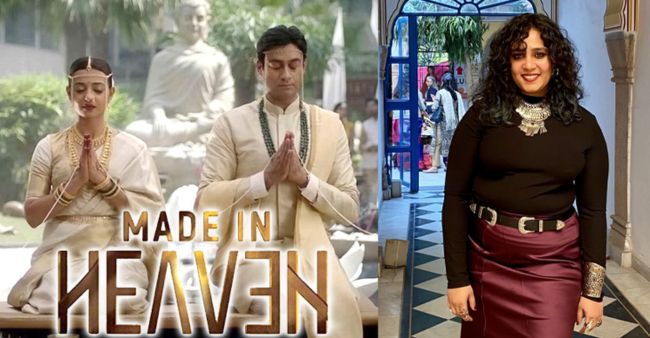While ‘Made in Heaven’ season second is being appreciated for touching upon themes like casteism, physical abuse, colour discrimination, same-sex marriages, author Yashica Dutt claimed that the makers have used her work without consent.
A few days ago, Yashica took to social media and penned a lengthy post, claiming that Radhika Apte’s character in Episode 5 was based on her life.
However, on Thursday, the ‘Made in Heaven’ team issued an official statement and denied Yashica’s claims.
“We are deeply disturbed with the misleading reports and comments in context of author Yashica Dutt claiming formal credit for her ‘contribution’ to Made in Heaven, a show set around wedding planners and remarkable brides who challenge prejudices deeply ingrained in our society. In Episode 5 – ‘The Heart Skips A Beat’, we peek into the life of Pallavi Menke a fictional character. Pallavi Menke is a Maharashtrian Ambedkarite from the Vidarbha region who studied law at Columbia University. She grew up using a caste-neutral surname and was called Pallavi Kumar. She has now reclaimed her original surname, Menke a signifier of her true identity as a member of the Dalit community. Pallavi Menke is an academic who teaches at Columbia and is likely to be tenured as a professor,” filmmaker Zoya Akhtar posted on Instagram.
They elaborated on how Radhika’s character and how it is distinct from Yashica’s life or her book Coming Out as Dalit.
“She is a recipient of an Amnesty Award. All of this earns her the respect of her prospective in-laws, who belong to a different caste. At the same time, her in-laws think her identity as a Dalit is better brushed under the carpet. The central conflict of the episode is whether Pallavi should fight to have the wedding rituals that are a signifier of her identity, or not. None of the above is drawn from Yashica Dutt’s life or her book – ‘Coming Out As Dalit’. We categorically deny any claim that Ms. Dutt’s life or work was appropriated by us,” the makers stated.
The statement also addressed the use of the phrase ‘Coming Out,’ noting that it originated in the 1950s and therefore wasn’t derived from Yashica’s book.
‘“Coming out’ is a 1950’s academic LGBTQIA term that was first used by Sumit Baudh in the Indian caste identity context in 2007. He used this in an article he wrote for Tarshi [a non-governmental organisation working on issues of sexuality]. A decade later it was used by Ms Dutt in her book. This term has since become common parlance for reclaiming caste identity,” the makers said.
In the episode, Menke mentions a book titled Denied, which makers said was a “hat-tip” to other books about the Dalit experience, including Dutt’s Coming Out As Dalit, Sujata Gidla’s Ants Among Elephants, Suraj Yengde’s Caste Matters and Sumit Baudh’s article in Tarshi.
Menke’s reference to her grandmother is “a common history that came up recurrently in our research on the community”, the statement added.
It concluded, “We will continue to platform stories and voices that are truly bigger than us.”
The statement was signed by Zoya Akhtar, Reema Kagti, Alankrita Shrivastava and Neeraj Ghaywan, who directed the episodes of ‘Made In Heaven Season 2’.






















